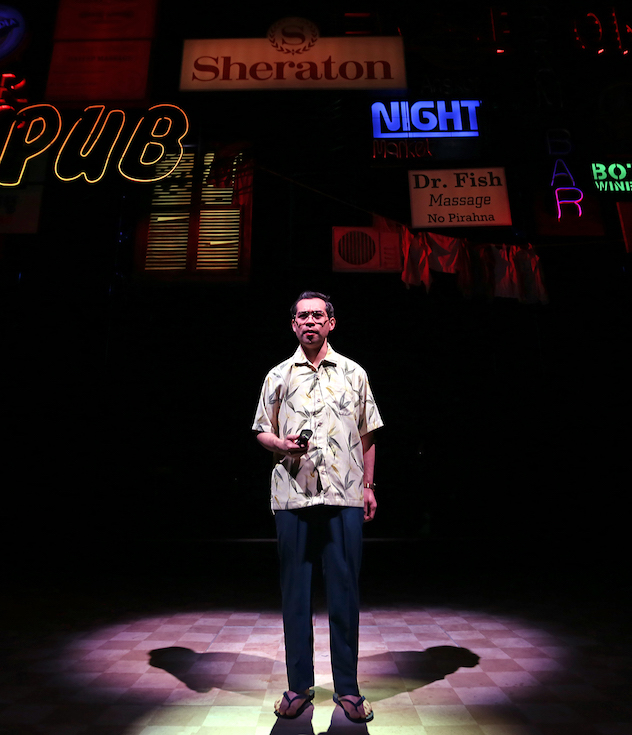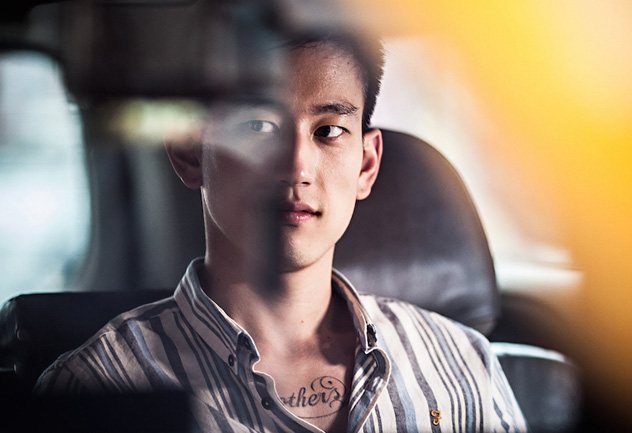The rock ’n’ roll revolution that ruled Cambodia through the ’60s and ’70s, and squashed by a brutal communist regime, is front and center in “Cambodian Rock Band,” a new play by playwright Lauren Yee.
When the Khmer Rouge arrived in Cambodia in 1975, it wiped out an estimated two million Cambodians, among them an estimated 90 percent of the country’s thriving artists, musicians and intellectuals. In Yee’s story, the former bassist of a Cambodian rock band who was forced to give up music and imprisoned inside S-21, the regime’s most infamous facility, tries to prevent his American-born daughter from uncovering details of his past.
“Cambodian Rock Band,” directed by Chay Yew, runs through March 25 at the South Coast Repertory in Costa Mesa, with a cast led by Joe Ngo and Brooke Ishibashi, playing father Chum and daughter Neary, and supported by Daisuke Tsuji, Raymond Lee, Abraham Kim and Jane Lui.
In the play, which jumps back and forth from 2008 to the ’70s, Chum is a young musician when he is locked up in S-21 and meets Comrade Duch, the head of the facility and one of the Khmer Rouge’s most notorious leaders. Meanwhile in 2008, Neary has found startling evidence that could lock up Duch, but that could also change her perception of Chum forever.
With “Cambodian Rock Band,” Yee was seeking an outlet through which she could share the history of music — and tragedy — in the Southeast Asian country.
Her fascination started seven or eight years ago, when a friend dragged her to a San Diego music festival. There, she discovered Dengue Fever, a contemporary Los Angeles act that performs Cambodian oldies.
“As soon as I heard it, I was like, ‘Oh my god. This is amazing. What is this? I need to hear more,’” Yee said. That was the edge of the rabbit hole. What she found, as she dove into research into the Khmer Rouge and as she met with Cambodian American leaders in Southern California, was a story of survival, of both the once-omnipresent music scene and of Cambodia’s people.
Yee, who is Chinese American, grew up in San Francisco and has always loved storytelling, and knew she wanted to write plays, since she was little. Her works include “King of the Yees,” “Ching Chong Chinaman,” “The Hatmaker’s Wife” and “The Great Leap,” a tale inspired by her father’s basketball career that wrapped its premiere run in Denver earlier this month.

Daisuke Tsuji and Joe Ngo in “Cambodian Rock Band” (Courtesy photo South Coast Repertory)

Left to right: Brooke Ishibashi, Joe Ngo, Jane Lui, Raymond Lee, Abraham Kim in “Cambodian Rock Band” (Courtesy of South Coast Repertory)

Lauren Yee (Photo courtesy of South Coast Repertory)
She connected with this part of Cambodian history through an exploration of the father-daughter relationship, a running theme that has surfaced in her past works, most prominently in “King of the Yees,” which details her own connection with her father. “Even if you are not an immigrant, or gone through something like the Khmer Rouge, you identify with the idea of one generation’s struggle to tell the next generation about themselves, and how hard that can be,” she said. “It’s this question of, how well do you know your parents?”
She also brought into production her original inspiration Dengue Fever, which is led by Cambodian American singer Chhom Nimol, and incorporated a handful of their songs into the project. The play uses a live band and 13 songs, by Dengue Fever and some oldies.
“[Cambodian Americans in the local community] have been very, very supportive,” she said. “They see the show and say, ‘I see myself there. I see my relationship with my parents there.’”
For more information about the play, visit South Coast Repertory.









